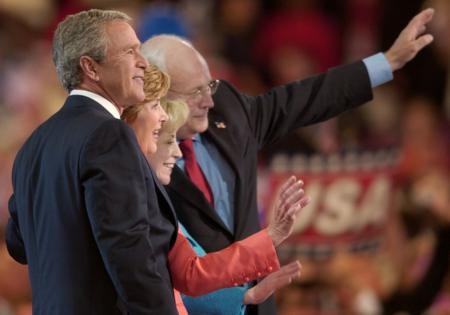

OK, so after a title like that, you probably figure my next article will be about the sun rising in the morning, or the fact that economic changes tend to operate in cycles. But it seems fit to me, to explain why President Bush should be re-elected, rather than just review the numbers.
To be honest, when President George W. Bush ran for President in 2000, I supported him because he was the Republican candidate, and because I could not find a single valid reason to support the Democrats' candidate, then-VP Al Gore. As for Ralph Nader and the other minor-party selections, far too many of them were single-issue candidates, and others frankly lacked the minimum resumes to be taken seriously. As for Dubya himself, I liked him, but if the Democrats had been able to field, say, a candidate serious about foreign policy, serious about judicial restraint, serious about being a Democrat more like Truman than McGovern, more like John Kennedy than Ted Kennedy, I would have seriously considered the Democrat.
My opinion of Dubya was confirmed, however, in his first foreign crisis. Many people have forgotten the collision between a Navy plane and a PRC fighter jet in international waters during early 2001. The matter could easily have been a disaster, if the response had been too far in either direction. If Bush had been too strong, he could have precipitated a military incident, with loss of life in addition to the Chinese pilot who died in the crash. If Bush had been too passive, the US could have forfeited their right to aerial and electronic reconnaissance in international airspace. Far too many people never watched the response, the carefully measured words and actions, which got back the crew of the aircraft, while not dwelling on the loss of the aircraft itself. But President Bush established himself as a master of foreign policy long before the 9/11 attacks, by showing a keen understanding of stakes, appearances, and broader strategy beyond daily events. Dubya's strategic response to the 9/11 attacks, merely continues a practice of applying crisis to accomplish greater goals.
As for the tax breaks, no Democrat will ever conciously admit that George W. Bush understand economics, never mind his MBA from the Harvard Business School. That's why John Kerry thinks it's a good idea to remind people, that Bush wanted to create significant tax cuts even before 9/11. What Senator Kerry, "nuanced" or not, seems to miss, is that the motive and effect of the tax cuts was accelerated by the Al Qaeda attacks. President Bush saw the recession coming, and so developed the tax cuts proposal as a two-pronged plan; to force the federal government to rein in spending, by shooting a clear shot across the bow, and to provide tax relief to the small businesses who would need it the most, having been the most maligned by the existing tax code. When 9/11 slammed the economy to the ground, the need for tax cuts, to get money into people's hands as soon as possible, became even more vital. Since John Kerry still doesn't seem to understand these elementary concepts, the disparity between these two main candidates is even more pronounced.
President George W. Bush, clearly, should win re-election as President of the United States. now that the first results of the GOP Convention are coming in, it looks as though the nation will choose wisely.

No comments:
Post a Comment